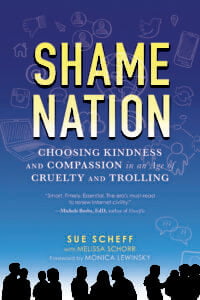
The importance of online reputation and your teen.
The majority of young people (tweens and teens) are on social media ‘a lot’ and according to the most recent PEW Survey, 45 percent of teens (13-17 years old) are connected almost constantly which is up from 24 percent in 2015.
We commonly hear how some apps are dangerous or other apps are breeding grounds for online bullies and hateful content.
In many cases it’s not as much about the app or technology, but it’s about human behavior.
We’re all a click away from….. from that oops moment.
Many kids jumped on social media when they were 13 years old (or younger) and they started building their digital footprint (whether they realized it or not). Even parents that carelessly overshare their child’s images or information about them could be putting their future online reputation at risk.
That might be a stretch — but it’s not out of the question.
Your online reputation can and will dictate your future.
Some 75 percent of colleges will preview a student’s online behavior prior considering them for acceptance, while 70 percent of employers will screen your social media before inviting you for an interview.
Reboot your online reputation
Is your teen getting ready to graduate high school? Heading to college? Maybe they’re graduating college – and heading into the workforce. Have they dusted off their digital profile lately?
It’s time for teens to reboot their online reputation from their tween-age self and start thinking about their future.
- Backstalk yourself: Take the time to backstalk yourself on social media. Scroll through your old Facebook or Instagram posts and tweets and freely use your delete button or click un-like on some of your youthful indiscretions. Does your seventh grade obsessions reflect who you are today? Maybe there are photos that are overly sexual or show yourself drinking or partying that you may want to eliminate.There’s also no harm in removing friends’ comments that are distasteful.
- Build a blog or website:This is a great way to showcase your interests, awards, community service involvement, movie and book reviews and even poems or other writings you to have to share. Blogger through Gmail or WordPress offer simple free blog sites to get started on a blog, or you can start a free website on sites like Wix.
- Redefine your bio. Are you still hanging on to Cutie4U[at]aol.com or @ChilliNBeanZ? It’s time to retire your silly email addresses and handles and create a more mature (yet exciting) bio that tells your audience you’re passionate about life and your interests. Consider using an email with your name such as john.doe[at]gmail.com and @JohnDoe – try to get as near to your a name as possible. When resumes are submitted with crazy email addresses, some have been tossed aside.
- Practice patience. This isn’t easy for youth. Help your teen to think through the possible consequences of what they post online. Remind them that there is no rewind, once it’s posted it’s nearly impossible to take back. Fifteen minutes of humor is not worth a lifetime of humiliation.
- Sext education. Handle sex and tech with care. More surveys are sharing that the older the teenager is, the more likely they are to send or receive a sexual message. Does your teen understand the consequences (both legal and online ramifications) of sexting? Be sure you are having these conversations early and frequently.
- Digital resilience. Your teen will, no doubt, will deal with some form of online hate or harassment at one time or another. Be sure they are prepared for the ugly side of the Internet. Don’t allow cyber-combat to destroy their online reputation.
As the saying goes, you don’t get a second chance to make a first impression — today that first impression is likely what the Internet is saying about you. Are you Google ready?
 Order Shame Nation book today — it offers fantastic firsthand stories as well as advice, resources and tips to help you and your teens survive this new digital world that is now the driving force of our financial and emotional future.
Order Shame Nation book today — it offers fantastic firsthand stories as well as advice, resources and tips to help you and your teens survive this new digital world that is now the driving force of our financial and emotional future.
- Preventing digital disasters
- Defending your online reputation
- Building digital resilience
- Reclaiming online civility
